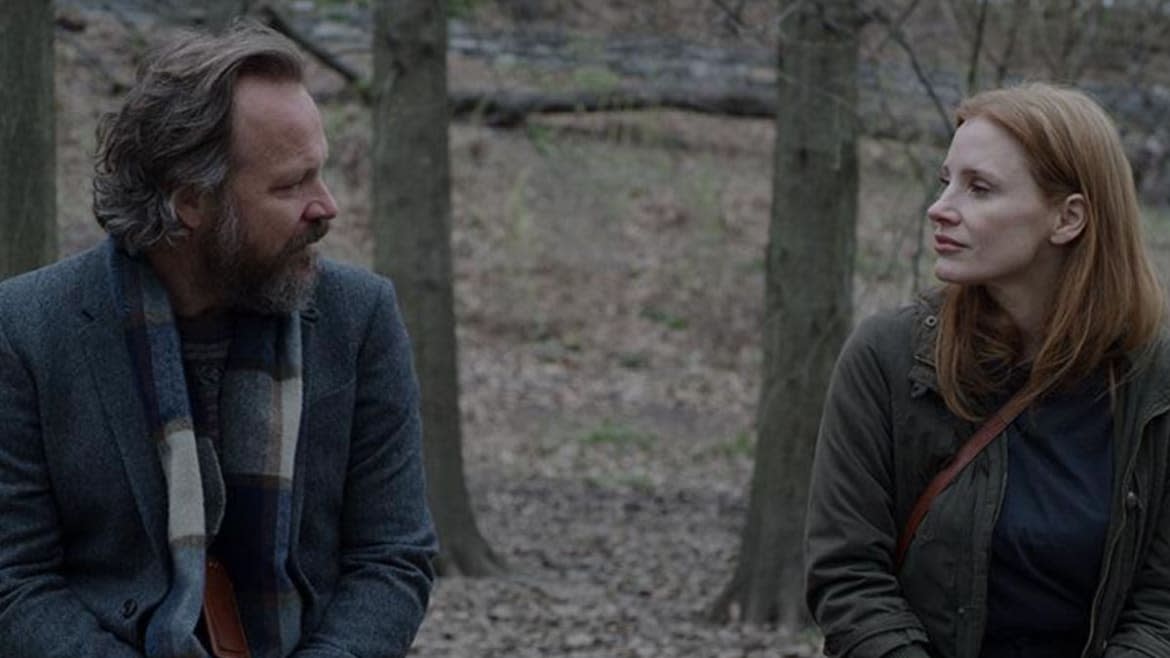Jessica Chastain’s New Film ‘Memory’ Is an Acting Olympics That Falters

VENICE, Italy—There are several enormous instances of Chekhov’s Gun in Memory.
The film, which premiered Friday at the Venice Film Festival, opens at an Alcoholics Anonymous meeting, where Sylvia (Jessica Chastain) is celebrating her 13th year of sobriety. We later see her padlocking her front door. The instinct of most viewers would be to expect these things to turn up later in the narrative—a certain type of Hollywood drama calls for characters to fall off the wagon, or be forced to confront their worst fear.
But, in a scarcely believable development—especially considering that Michel Franco, this film’s director, has always indulged his penchant for cruelty and manipulation—Memory doesn’t serve up the whole platter of trauma porn that it had seemed to be preparing. What remains is a somewhat odd object, whose wealth of ideas and initially gritty outlook are gradually subsumed into a more conventional story, with performances that are perhaps a touch self-regarding.
Peter Sarsgaard plays Saul, a man with dementia who follows Sylvia home after meeting her at a school reunion. This obviously prompts her, a survivor of abuse in her youth, to panic and fear for herself and her teenage daughter, over whose life and behavior she exerts a rigid control. After a series of minor contrivances, Sylvia patches things up with Saul and she is employed by his brother (an underused Josh Charles) as his caregiver. An evident bond is born between these two damaged souls—Sylvia desperate to forget and Saul unable to remember.
Franz Rogowski’s ‘Passages’ Wardrobe Is a Sexy, Genderfluid Revelation
Memory is evidently torn in two directions. On the one hand, it chooses the path of sobriety, giving a measured view of Sylvia and her life in some well-described scenes at work, at an AA meeting, and with her daughter. We see how firmly she refuses alcohol at various shindigs, and how omnipresent that temptation is; from a scene of her cleaning her apartment, we observe what force of will she has clearly had to draw on in order to make a life for herself and her child. Chastain excels at showing Sylvia’s constant tension, with a face set in determination and a permanently stiff back portraying her permanent social discomfort. Those shoulders drop a little, eventually, in the presence of Saul, who is gentle and similarly lost.
But though Memory is capable of restraint and has the resources to establish its characters in ways that feel lived-in and convincing, it also resorts to shortcuts, and to underlining its intent. That comes out in an early scene that skews too dramatic, where Sylvia mistakenly confronts Saul about his having abused her in their youth. This is a misstep in several ways.
First, it allows an unfortunate note of doubt to creep in, which creates suspense around the question of whether or not Sylvia is telling the truth about her ordeal. This feels coarse and gratuitous. Second, it fits poorly with the work of characterization that we have seen so far, making the moment feel thin. Third, it obstructs the narrative, because we are supposed to believe that after this moment, Saul and Sylvia begin a romance together.
That tendency—a cheapening instinct to exploit pain for the sake of theatrics—rears its head a few more times, making for an uneven film with a somewhat compromised tone. Ultimately, Sylvia’s big breakdown scene, which is in the cards from the moment we see her, sounds a few false notes because it plays its drama too easily. Faced with a mother who never believed her, and having floated the possibility that Sylvia might indeed be a compulsive liar, Memory stages a family argument that tells rather than shows. “It’s not my fault you’re a failure,” and other such barbs from Sylvia’s mother (played with a little too much emphasis by Suspiria’s Jessica Harper), are overstated and unconvincing. Chastain shows well how Sylvia’s composure is at all times close to crumbling, and is ably supported by the ever-excellent but underused Merritt Wever as Sylvia’s sister, whose impotent, awkward body language in this scene speaks volumes about her own suffering.
As Saul, whose own character is sort of phased out by Sylvia’s storyline, Sarsgaard is faced with a nightmare of a role. He ends up describing this kind, forgetful man as a generous spirit, but an inevitable blankness remains, and Saul is really only identified by his ordeal and smiling sweetness. It’s debatable whether his chemistry with Chastain quite prepares us for the romance between them, or for their sex scene. Saul’s illness is circumscribed very loosely, so we’re unsure what this man is able to remember and notice, leading to an unfortunate vagueness around him. Still, the camaraderie between the actors comes out in a few scenes of much-needed levity, such as a scene where Saul orders “the usual” at a restaurant without knowing what that might be. Sylvia’s shy pleasure, never fully committing to belly laughter, rings true here.
Bradley Cooper’s ‘Maestro’ Crackles With Showmanship—Sometimes Too Much of It
The subject of two wounded creatures finding solace in one another is hardly new territory for cinema, and Memory doesn’t reinvent that particular wheel, but the odd moment of truth still shines through the déjà-vu every once in a while, convincing us with the force of its own self-evidence.
Keep obsessing! Sign up for the Daily Beast’s Obsessed newsletter and follow us on Facebook, Twitter, Instagram and TikTok.
Get the Daily Beast's biggest scoops and scandals delivered right to your inbox. Sign up now.
Stay informed and gain unlimited access to the Daily Beast's unmatched reporting. Subscribe now.


